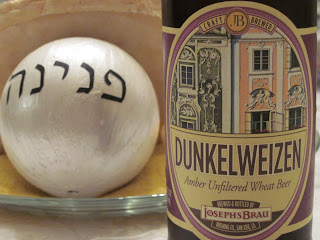
This week's Sunday Night Suds looks at Joseph's Brau Oktoberfest.
I just could not let the entire month of October go by without at least one Oktoberfest review. (Click here for the October 2009 SNS review of Saranac Octoberfest or here for the October 2008 SNS review of Brooklyn Brewery Oktoberfest).
To briefly recap, the style of beer known as Oktoberfest came about as a result of efforts to brew beer in the winter which was to be imbibed in the spring. As explained by the gurus at BA:
Before refrigeration, it was nearly impossible to brew beer in the summer due to the hot weather and bacterial infections. Brewing ended with the coming of spring, and began again in the fall. Most were brewed in March (Märzen). These brews were kept in cold storage over the spring and summer months, or brewed at a higher gravity, so they’d keep. Märzenbier is full-bodied, rich, toasty, typically dark copper in color with a medium to high alcohol content.The Joseph's Brau Oktoberfest poured a dark copper color and had more than a little hops in the brew. After having picked up a six pack at Trader Joe's (quite reasonable at 5.99 + tax and deposit) early last week, I tried it with a number of different dishes over the course of the week. (If you have the inclination, its not a bad way to see what kind of beer/food pairings work for you - just buy a sixer and try one each night with a different meal). I enjoyed mine with some London broil and potatoes and the flavors worked quite well.
The common Munich Oktoberfest beer served at Wies'n (the location at which Munich celebrates its Oktoberfest) contains roughly 5.0-6.0% alcohol by volume, is dark/copper in color, has a mild hop profile and is typically labeled as a Bavarian Märzenbier in style.
Joseph's Brau Oktoberfest is under the Kosher Supervision of the Va'ad of Detroit and there is a tiny Va'ad Hakashrus symbol on the back of the bottle. Please keep in mind that not every Trader Joe's brew is under kosher supervision, so check the label or search my site for the link to the latest list of beers under kosher supervision.To see what the experts on Beer Advocate think about Joseph's Brau Oktoberfest, please follow this link http://beeradvocate.com/beer/profile/10707/33029.
As always, please remember to drink responsibly and to never waste good beer unless there is no designated driver. If you've tried this beer or any others which have been reviewed on the kosher beers site, please feel free to post your comments (anonymous comments are acceptable).
Finally, if you have seen this post being carried on another site, please feel free to click http://www.kosherbeers.blogspot.com/ to find other articles on the kosherbeers blogsite. Hey its free and you can push my counter numbers up!






